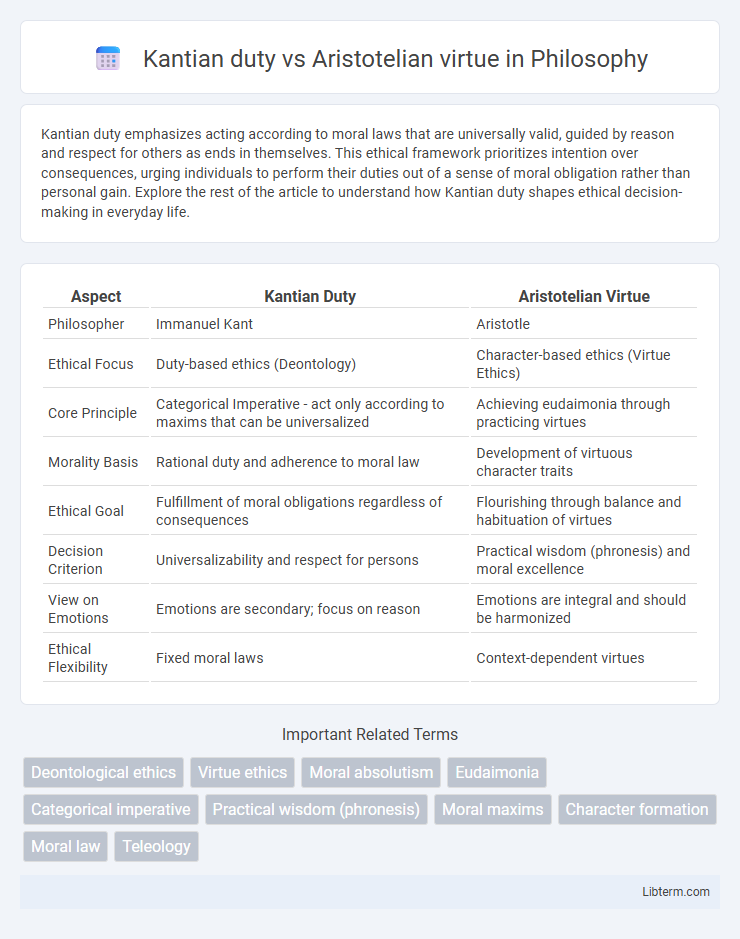Kantian duty emphasizes acting according to moral laws that are universally valid, guided by reason and respect for others as ends in themselves. This ethical framework prioritizes intention over consequences, urging individuals to perform their duties out of a sense of moral obligation rather than personal gain. Explore the rest of the article to understand how Kantian duty shapes ethical decision-making in everyday life.
Table of Comparison
| Aspect | Kantian Duty | Aristotelian Virtue |
|---|---|---|
| Philosopher | Immanuel Kant | Aristotle |
| Ethical Focus | Duty-based ethics (Deontology) | Character-based ethics (Virtue Ethics) |
| Core Principle | Categorical Imperative - act only according to maxims that can be universalized | Achieving eudaimonia through practicing virtues |
| Morality Basis | Rational duty and adherence to moral law | Development of virtuous character traits |
| Ethical Goal | Fulfillment of moral obligations regardless of consequences | Flourishing through balance and habituation of virtues |
| Decision Criterion | Universalizability and respect for persons | Practical wisdom (phronesis) and moral excellence |
| View on Emotions | Emotions are secondary; focus on reason | Emotions are integral and should be harmonized |
| Ethical Flexibility | Fixed moral laws | Context-dependent virtues |
Understanding Kantian Duty: The Foundations of Deontological Ethics
Kantian duty forms the cornerstone of deontological ethics, emphasizing actions guided by universal moral laws derived from reason rather than consequences. Immanuel Kant's categorical imperative insists that individuals act only according to maxims that can be universally willed, highlighting the intrinsic value of duty. This framework contrasts with Aristotelian virtue ethics, which centers on character development and moral virtues cultivated through habituation.
Aristotelian Virtue: Exploring the Ethics of Character
Aristotelian virtue ethics emphasizes the development of moral character through habituation and the pursuit of eudaimonia, or flourishing, by embodying virtues like courage, temperance, and justice. Unlike Kantian duty ethics, which prioritize adherence to universal moral laws and obligations, Aristotelian virtue centers on cultivating practical wisdom (phronesis) to navigate complex moral situations. This approach highlights character formation as essential to ethical behavior, integrating emotion and reason in the continuous process of moral growth.
Duty Versus Virtue: Key Conceptual Distinctions
Kantian duty centers on adherence to moral laws dictated by reason, emphasizing actions performed out of obligation regardless of consequences. Aristotelian virtue focuses on character development through habituation, promoting moral excellence by cultivating traits that enable individuals to achieve eudaimonia, or flourishing. The primary distinction lies in Kant's rule-based ethics versus Aristotle's virtue ethics, where duty is external and categorical, while virtue is internal and cultivated over time.
Moral Motivation: Obligation in Kant, Aspiration in Aristotle
Kantian duty emphasizes moral motivation rooted in obligation, where actions are performed out of respect for the categorical imperative and adherence to universal moral laws. Aristotle's virtue ethics grounds moral motivation in aspiration, encouraging the cultivation of character traits that lead to eudaimonia, or human flourishing, through habituated excellence. While Kant prioritizes duty as an external compulsion to moral law, Aristotle focuses on internal development and the pursuit of a virtuous and fulfilling life.
Universal Moral Laws vs Contextual Moral Wisdom
Kantian duty emphasizes adherence to Universal Moral Laws grounded in rationality, prescribing actions that must be performed irrespective of circumstances. Aristotelian virtue centers on Contextual Moral Wisdom, advocating for practical judgment (phronesis) to cultivate character traits appropriate to specific situations. While Kantian ethics demands absolute obligations, Aristotelian ethics promotes flexible virtues shaped by experience and social context.
The Role of Reason: Categorical Imperative and Practical Wisdom
Kantian duty centers on the Categorical Imperative, which demands actions be guided by reason as universal moral laws, emphasizing duty irrespective of consequences. Aristotelian virtue ethics relies on practical wisdom (phronesis), where reason informs the cultivation of character traits to achieve eudaimonia, or human flourishing, through balanced, context-specific judgment. Both frameworks prioritize reason but diverge in application: Kant prescribes absolute moral imperatives, while Aristotle advocates flexible, experience-based discernment for virtuous living.
Autonomy and Happiness: Contrasting Ethical Goals
Kantian duty emphasizes autonomy, grounding moral action in rational self-governance and adherence to universal moral laws without regard to personal happiness. In contrast, Aristotelian virtue ethics prioritizes eudaimonia, defining happiness as flourishing achieved through the cultivation of character and practical wisdom. The contrast highlights Kant's focus on duty as an autonomous imperative versus Aristotle's holistic goal of a fulfilling, happy life through virtuous behavior.
Application to Modern Moral Dilemmas
Kantian duty emphasizes adherence to universal moral laws derived from reason, guiding actions based on categorical imperatives regardless of consequences, making it instrumental in addressing modern ethical issues like data privacy and AI ethics through clear-cut rules. Aristotelian virtue ethics centers on cultivating character traits such as courage and temperance, promoting moral dilemmas' resolution by fostering practical wisdom (phronesis) and context-sensitive judgment, relevant to complex situations like bioethics and environmental stewardship. Applying both frameworks offers complementary insights for contemporary moral dilemmas, balancing strict duty-based obligations with nuanced, virtue-driven considerations.
Critiques and Challenges: Strengths and Limitations of Each Approach
Kantian duty ethics emphasizes universal moral laws and intentions, facing critiques for its rigidity and potential neglect of context and emotions in moral decisions. Aristotelian virtue ethics, centered on character development and practical wisdom, is challenged for its relative vagueness in guiding specific actions and cultural variability. Both frameworks offer strengths--Kant's clarity in duty and Aristotle's focus on moral character--yet limitations arise from Kant's deontological absolutes and Aristotle's reliance on subjective virtue cultivation.
Integrating Duty and Virtue: Toward a Comprehensive Moral Theory
Kantian duty emphasizes adherence to universal moral laws grounded in reason, while Aristotelian virtue centers on cultivating character traits that enable human flourishing. Integrating duty and virtue offers a comprehensive moral theory by combining the objective rigor of Kant's deontological ethics with the contextual sensitivity of Aristotle's virtue ethics. This fusion addresses the limitations of each framework, promoting moral actions guided by principled obligations and virtuous dispositions tailored to real-life complexities.
Kantian duty Infographic

 libterm.com
libterm.com